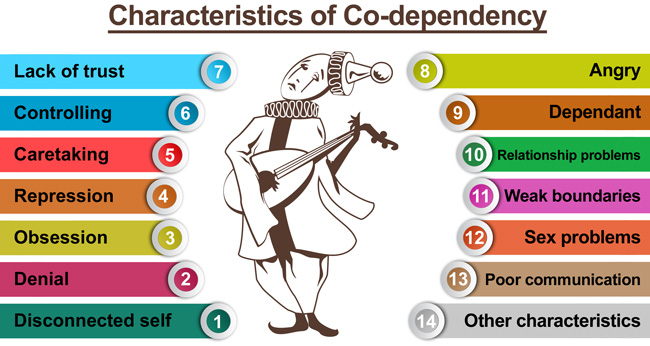A person who suffers from codependency will feel that they will only be happy or content or find peace with themselves through someone else. They will seek out relationships and marriage with people who will give them happiness, even if it is not real happiness. They will potentially become abused, victimized, degraded, belittled, and hurt. Yet they may continue to remain in the unhealthy relationship. In many cases, codependents will skip from one relationship straight into another without having time to consider their own needs. A codependent believes that they are not worthy of being happy and in a loving relationship and that pain and suffering is what they are destined for. This unhealthy attitude sets them up to fail at having meaningful and caring relationships and may in fact go to lengths to push people away so that they are hurt.
Low Self Worth
A codependent relationship with a person who suffers from a substance abuse problem can add to a lack of self confidence and self-esteem. The substance abuser may live a life that revolves around taking drugs or drinking alcohol and everything and everyone else fits in around the drug abuse. For a codependent, this means that they will never be the priority in an addicts life and they will find the relationship dysfunctional, destructive and harmful to them. A codependent will use this relationship as a way to prove that they are not worth anything, that they don’t deserve more and that they are a victim. They will martyr themselves and be self deprecating for attention but will push away genuine offers for help or support.
Denial
Denying problems and pretending they don’t exist or that they are not serious or will go away, is a common symptom of a codependent relationship. This is particularly the case for people who also have a substance abuse problem in a relationship. The codependent may take significant steps to hide the abuse and the addiction going as far as to lie to friends and family about the extent of the problem. Parents may use their finances or influence to get a child out of trouble with the law if their child is a drug addict, spouses may cover up their partners drinking, friends will brush off criticisms of their alcoholic friend. This denial contributes to the problem that the addict is going through and may actually magnify the problem. Enabling a person to engage in drug taking behavior without criticism or retribution does not help the situation nor does it reduce the risks associated with the abuse.
Enabling and Unhealthy Codependence
In an unhealthy relationship, individuals will tend to make their partners dependent on them. For instance, by enabling their alcoholic’s or addict’s unhealthy behaviors, an unhealthy person can ensure that their partner needs them. In these circumstances, the alcoholic or addict receives many subtle cues telling them that it is all right to indulge themselves as long as they let their partner know that they are needed.Enabling was how I kept my alcoholic addict dependent on me. In retrospect I realize that rescuing my alcoholic addict from the repercussions of her behavior fed my ego. It made me feel necessary in her life. Even when she treated me badly, at some level I believed that she couldn’t survive without me to take care of her. In an unhealthy relationship, when the addict or alcoholic takes steps to dealing with their problems, the codependent will often sabotage their efforts.
Codependence works the same way, whether the addiction is drugs, alcohol or something else, such as sex, gambling, verbal or physical abuse, work or a hobby. If the addicts’ behavior causes worry, forcing the partners to adjust to and deny the problem, they are at great risk of becoming codependent. Those who were abused as children face an even greater risk.
General Codependency Test
- Do you tend to believe people’s promises, even when they have repeatedly broken promises before?
- Do you find yourself making excuses for those you care about in order to protect them from the repercussions of their poor choices?
- Do you give money to people to pay bills that they could and should pay for themselves?
- Do you often feel lonely in your relationships?
- Do you avoid confronting people when they are behaving unacceptably?
- Do you try and fix other people’s problems even if they don’t ask for help?
- Do you have trouble saying no to people without feeling guilty?
- Do you find yourself spying on those you care about?
- Is much of your time spent helping people who you believe need you?
- Do you need to feel needed?
- Do you feel upset or angry if someone tells you that they don’t want your help?
- Has anyone repeatedly told you to stop trying to help them?
- Do you feel responsible for other people’s actions?
- Do you lose sleep worrying about the repercussions of other people’s choices?
- Do you ever remind people that they need you?
- Do you believe that you are obligated to help other people?
- Do you suppress your feelings about other people’s behavior until eventually you explode with anger?
- Do you sometimes feel that other people’s bad choices are your fault?
- Do you enable other people’s bad behavior?
- Have you ever sabotaged other people’s attempts to change their lives?
- Do you every feel ashamed of the people that you help?
- Do you often give advice, even when it is not requested?
Did you answer Yes to four or more of these questions? If so, your relationships may be unhealthily codependent. If you don’t address your unhealthy codependence, relationships will likely continue to be unnecessarily painful. You may want to consider counseling or psychotherapy to deal with this issue with a behavioural-cognitive approach.
Sources:
http://www.my-alcoholic-addict.com/general-codependency-test.html
http://alcoholrehab.com/drug-addiction/co-dependency/
http://www.alcoholanswers.org/friends-family/codependency.cfm
http://psychcentral.com/lib/what-is-codependence/

 RSS Feed
RSS Feed
